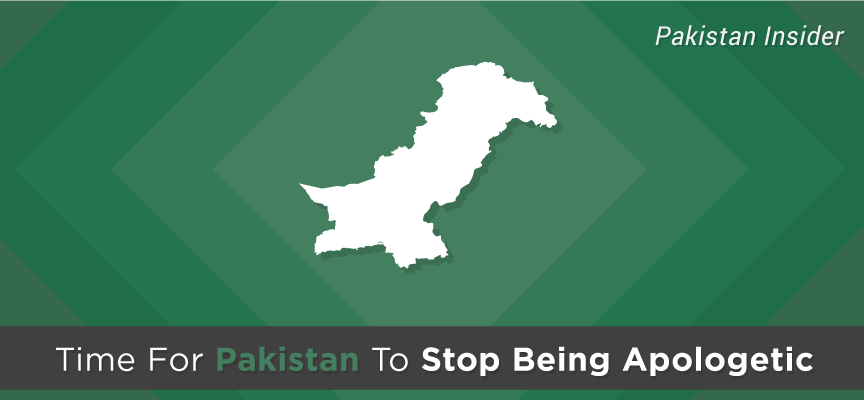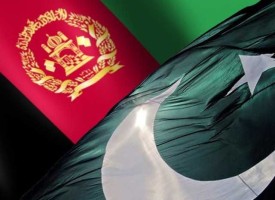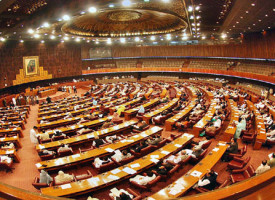Terrorism, mounting debt, inter-communal strife, etc. Yes, Pakistan has it all, but it is not the only country facing such circumstances.
No one could have imagined that the second millennium would witness the drastic re-shaping of global geopolitics. The security scenario post 9/11 brought about the emergence of a joint US-NATO (Pacific-Atlantic)-dominated war establishment that, to this day, dictates the ‘acceptables’ and ‘unacceptables’ of regional engagements. A recent exception, however, is Russia’s involvement in Ukraine and now Syria, both of which are eyesores for totalitarian hawks who cannot accept a competing superpower in the Eastern hemisphere.
Which brings us to the question of what role Pakistan has, and can play, in the prevailing circumstances.
For starters, Pakistan is located in one of the most strategic locations on the planet. Call it sheer fortune or fate, Pakistan’s mere geography provides the foundation for its significance; it is a piece of territory which cannot be ignored and which, on the contrary, is a necessity for regional and extra-regional stakeholders to survive in the neighborhood. This is not a veiled threat in terms of security. Pakistan provides the most feasible and convenient transportation routes to game-playing economies in the region. South Asia, Central Asia, Eurasia, the Middle East and the Indian Ocean all lie in its trajectory. With a volatile Afghanistan to its west, Pakistan’s proven know-how in Afghan affairs gives it the impetus to become a strategic necessity for world powers.
Since the release of the first set of known terrorists from US custody at Guantanamo, the likes of which included Abdullah Mehsud and Baitullah Mehsud, Pakistan has witnessed an apparently unending wave of terrorism. Tens of thousands of local civilians, military personnel, politicians, law-enforcement personnel and academicians have lost their life at the hands of local proxies almost always connected to external controllers. The people of Pakistan are reminded or rather repeatedly taunted that whatever they face is the blowback/fallout of the state’s past policies, most notably the illegitimate involvement in Afghan state affairs. Most of us easily accept their accusations per se because we feel it is true and that Pakistan was supposedly ambitious in aiding the US and Saudi Arabia in fighting against Soviet troops on Afghan soil.
Such people are not to be blamed, however their argument is not entirely true.
Prevailing circumstances at any given point in time, perhaps specially during regional developments, shape a country’s net assessment. Priorities are accordingly highlighted and kept in view in order to shape the most effective and relevant solution. For Pakistan, stepping onto foreign turf in Afghanistan was not an act of defiant adventurism but rather a situational compulsion. As we look back to what transpired in the past, we now understand decisions taken back then ‘seemed’ to be strategic but were just operational in nature. The lack of long-term strategic planning, say, keeping a 25-year future in perspective, is one of the fundamental reasons why Pakistan’s military leadership failed to develop a coherent game plan which could provide swift contingency tactics in the face of undesirable outcomes. Plus, the backdrop of a Cold War-infested mindset prevented many of the otherwise saner elements in the security apparatus to constitute organizational reform and re-orientation. The doctrines and strategies thus formulated kept only the then-prevailing scenario in view.
In an ideal and certainly preferable situation, the country’s national leadership should have revised its tactics, techniques and procedures to deal with threats which could emerge in the near and long-term future. A visible change in the national mindset was witnessed during the Musharraf regime. However, before it could progress into something viable, “political expediency” disallowed any such reforms from taking place. The military was caught between alliance with the US (ISAF) and appeasing the general population which viewed the Pak-US counter-terrorism cooperation with growing suspicion. Ordinary civilians aside, several of the senior high command was not taken into confidence on matters of national security.
During the Kayani era, there was somewhat of an openness in fighting against terrorists because the wave of suicide bombings, etc increased rapidly by the end of 2007 and early 2008. The national perception had gradually inclined toward supporting the Pakistan Army against miscreants, come what may i.e. even if it required US assistance. This tumultuous period faced a series of controversies and conspiracies as well. The world pressed Pakistan to “do more” and Pakistanis were fed up with “dying more”. Anger across the country transformed into growing negative sentiments toward the US and other countries which pressed Pakistan to tackle the menace of terrorism heads-on.
By this time, there emerged a crop of middle and senior-level officers (Colonel-level onward) who had faced battles and counter-terrorism operations firsthand, giving them an operational taste of irregular (asymmetric) warfare. No one in the 80’s could have even imagined that Pakistan would one day witness urban guerrilla warfare on its own soil too. The battle of perceptions and who has the most influential narrative kept continuing. Thus began the national leadership’s gradual transformation from India-centric operational thinking to strategic planning in the context of regional developments.
Most importantly, the unprecedented policy of (at least overt) non-interference by the military junta in civilian government affairs allowed the Asif Zardari regime to complete its stated tenure. Whatever international conspiracies and backdoor dealings were involved in the National Reconciliation Ordinance (NRO) etc can be discussed later. The point is, on the outset, each institution was doing what it is mandated to do and hence Pakistan witnessed positive reception overseas. Its image had been so refined that ties with Russia also started to defrost. Opposition political parties were active and this is why the formula of “co-existing” worked.
The world of today accepts and goes by what is apparent/visible and who has the power to call the shots.
Fast forward to 2015, and Pakistan has a ‘seemingly stable’ state apparatus with the civilian government, judiciary, military, media and bureaucracy working in tandem to mend past wrongdoings. The National Action Plan (NAP) has managed to create coherence and cooperation among institutions which are known for engaging in petty turf wars.
Here again, the military junta took the bold step of refusing to exercise caution while expressing the resolve against terrorism. There are no controversies, no if’s, maybe’s and but’s, the leadership is visionary and knows exactly what to do, and how. The civilian government enjoys the trust of Chinese investors (due credit must be given) and the largest geoeconomic investment project finally landed in Pakistan, the China-Pakistan Economic Corridor (CPEC).
Internal security aside, Pakistan is also one of the largest contributors to UN Peacekeeping Missions across the world. The country has paid a very heavy price in acquiring peace. Thousands have sacrificed their lives. Taunting by some world leaders might have stopped but we are still (now politely though) requested to “do more”.
The question is, how much? And for how long should we be suspected of insincerity in counter-terrorism efforts? What more can we do to give “assurances” (a despicable term indeed) to the world at large that we are committed to eliminating those who not only kill them, but us too!
With CPEC in our pocket and an increasingly reliant ISAF-NATO to our West, not to forget Pakistan’s well-considered national decision not to participate in the War on Yemen, Pakistan is receiving positive attention by observers across the world. The current national leadership has relied heavily on broadcasting its unequivocal belief for the fight against terrorism to all channels of information possible. The ulterior motive is to set our own house in order. The world takes note when Pakistan acknowledges extremism, under-development and lack of education as reasons for its internal security woes.
The rejectionist ‘all-righteous’ attitude of the past seems fast eroding. Pakistan is finally doing the unthinkable: accepting past mistakes/errors/blunders and setting the course right by removing black sheep (in politics, the armed forces, bureaucracy, etc).
We are heading towards a future in which Pakistan has an important role to play. We have lost so many precious lives, have regained international trust on our economy, our men and women are extremely talented, we behave more maturely than India when it comes to peace efforts (unlike the past), terrorism has considerably decreased. All this and more are indications of a country that has finally found the right course to set itself on.
Pakistan has no hegemonic ambitions. It has always maintained a defensive posture in the region. At least the world’s leading interventionist states know this well.
Today, we owe the world nothing. We have done whatever we could and we are still at it, trying to improve upon each previous day that goes by. We’ve had enough of bullying and it is high time we let go of a defeatist and apologetic attitude. To states which seem to be concerned about us, we have to remind them very categorically about our legacy of achievements, sacrifices and determination.
We cannot shame and dishonor our resilience anymore.
We’ve established sufficient credibility to stand our ground when we are shamed and accused of acts we did not commit and blunders we never made. We shouldn’t aspire to become aggressive like India but stating facts in strong words won’t harm us.
It’s finally time for Pakistan to tell world powers, “Stop taunting and misjudging us. We’ve had enough”.








the fact is pakistan has never been apologetic..
true —-
how sad is this that a nuclear power country is even apologetic infront of war-torn Afghanistan or india which is same like us or even worst than us and on top of that the worst of country Israel whose president refused to dine in the same hotel where nawaz sharif was in new york is showing eyes to Pakistan—- Israel a state whom Qaid e Azam regarded as an illegal child of west !!!!
but this apologetic behaviour can never go if nawaz sharif kept on carrying the katora’s(slavery baggage) to America
The country needs to say no to outside funding and to all types of aid which are be given on the stake of its sovereignty
Only Tahir ul Qadri inqalab is the solution where we can say no to anyone that harms the sovereignty of our country
Inshalla Inqalab ane ko hai
@Amna..why you always talk nuclear power..nuclear power ..and nuclear power..It does not make any sense always saying that you are nuclear power.Stop this first and take seriously the local issues such as education ,employment etc..